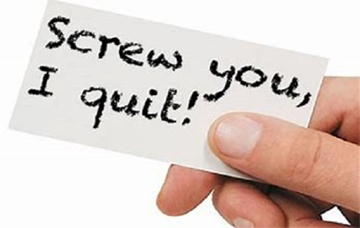Worse thing you can do as a potential freelancer is quit your day job before you’re ready.
For a lot of people in this modern economy, the dream of being a boss-less freelancer has become more than just an ideal preference, it’s become a situational necessity.
Whether it’s because these days ‘real jobs’ are scarcer worldwide or because the freedom of freelancing is far more alluring than showing up to someone else’s office every day, millions of modern workers are starting to make the shift from old-fashioned, regular-paying jobs to freelancing.
Thirty years ago, that was me.
I was a highly paid computer programmer for AT&T, but I had a dream of entertaining, or more specifically, doing comedy, full time.
Insane, right?
When I quit that killer, 401k-contributing career to begin doing stand-up comedy and hosting shows for the newly opened MGM Studios in Orlando, FL, my computer co-workers couldn’t believe I was giving up the security of the corporate world for the unknown (and sketchy) world of live entertainment.
But what they didn’t know is that I didn’t quit my day job until I did these five important things first.
These are the five critical steps I took to make the transition from day job to freelancing easier.
Why?
Because when you go from working for somebody else to being your own boss it not only takes talent, it takes preparation.
Do these five things first and your shift to freedom will be smoother, but avoid them and chances are your freelancing journey will be rocky and doomed from the start.
1) Take classes to learn your skill at a higher level
In my case, for example, at nights and on weekends I started showing up to a weekly stand-up comedy workshop where our instructor had us do five minutes of comedy on stage but in front of the other comics instead of a paying crowd.
That helped me to build up my very basic skills (holding a mic, dealing with bright lights, pausing for laughs, etc.) without having to fail in front of paying customers.
What classes or workshops are available online or in your community that are geared towards your freelancing interest?
Perfect example is Real Free Life (RFL) – it’s a program you can take while you’re still making your real-job money that will teach you how to discover what they call your Bat Signal Talent, or specialty, and how to build your authority around it so you become known as a go-to expert when it comes to that skill.
2) Get a related steady job and do lots of low-paying related side-work
Instead of quitting my computer job and going straight on the comedy road, I got a job performing at MGM Studios where every day for a few hours I was holding a mic on a stage in front of a crowd of people and ‘learning to play the scales’ of my craft.
Is there a day job related to your freelancing interest that you can switch to so you can get paid to learn and practice the basic skills of your craft?
3) Take lots of local low-paying freelance side-gigs to increase your experience
During my off hours at MGM, I started doing any free stand-up shows in the area that would have me and I would tape every performance and watch it afterwards.
Eventually I used the best footage to create a demo to get better work (meaning paid).
Because of this, before I started freelancing full time, I had already learned how to keep a gig calendar full and was beginning to learn how to negotiate pay and travel at a low level.
Are there places you can do your craft for low pay or (gasp) free where you can begin to develop your professional reputation and work habits?
4) Compile a list of ideal starter clients and begin contacting them
After a while, I began to recognize the clubs I did well in and started contacting them regularly and booked shows at them as often as my day job (and vacation time) would allow.
By the time I was ready to quit my day job, I had already identified new clients and had started the booking process with them, as well.
Who are your ideal freelancing clients?
Have you contacted them and asked them exactly what they’re looking for or missing?
5) Save every extra penny and create a big pile of F-U money
As soon as I made it my goal to become a freelancer, I began to spend less and save more of my real-job money so that by the time I quit there I had at least three months of rent and bill money stashed away, just in case.
Turned out I never needed to fall back on it, but having that sack of cash on hand gave me the confidence to go on the road, knowing I could still pay my bills every month.
Are you squirreling away as much F-U money as you can?
Are there unnecessary things you can sacrifice in your daily routine (that third Starbucks or that expensive dinner date, for example) so you can begin creating a nest egg for your freelancing security?
So there they are.
Five critical steps you can take to make the transition from day job to freelancing easier.
Do them and your shift to freedom will go a whole lot smoother, but avoid them and chances are your freelancing journey will be rocky and doomed from the start.
Your choice.






Good advice, Michael! Well-written, too!